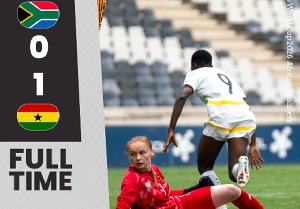The statements attributed to the judge who granted bail to the Chinese woman alleged to be a “queen-pin” in the importation of Chinese nationals to work with Ghanaians in carrying out galamsey here, filled my heart with grief.
How could the Attorney-General's office have failed the country so badly?
This is a very high-profile case in which our whole Government – from the President down – has an avid interest. The Attorney-General's Department, after the unimaginably deplorable failures it exhibited in the Woyome case, must be aware that public confidence in it, as a department, is extremely low. And yet the department went to court, in an equally sensational case, and proved itself incompetent again!
Here is what happened (and I don't think that the reports of the case that appeared in the media – amalgamated here – are necessarily exhaustive).
The reports said that the Accra High Court, on Friday 2 June 2017, granted bail to En Huang a.k.a. Aisha and four other Chinese alleged to be engaged in illegal mining (galamsey). En Huang was granted bail in the sum of Ghc 500,000 with two sureties , all to be justified. The four other Chinese were each granted bail in the sum of Ghc 500,000 with one surety, to be justified.
The court said all the sureties must be Ghanaians and their residences must be verified. Also, the passports and travelling documents of all the accused persons must be deposited with the court registrar, for onward transfer to the Director General of the Ghana Immigration Service.
The court, presided over by Mr Justice Charles Ekow Baiden, ordered the five Chinese to report to the Inspector -General of Police twice a week and also to the Director -General of the Ghana Immigration Service twice a week. The case was then adjourned to June 16, 2017 for the full commencement of the trial.
Aisha is charged with undertaking small-scale mining operations, contrary to Section 99 (1) of the Minerals and Mining Act, 2006, (Act 703), and providing mine support services without valid registration with the Minerals Commission, contrary to Section 59 and 99 (2) of the Minerals and Mining Act.
She has also been charged with the illegal employment of foreign nationals, contrary to Section 24 of the Immigration Act, 2000 (Act 573) and Regulation 18(1) of the Ghana Immigration Regulations, 2001 (L.I.1691).The four other Chinese - Gao Jin Cheng, Lu Qi Ju, Haibin Gao and Zhang Zhipeng - have been charged with disobedience of a directive given under the Immigration Act 2000 (Act 573.)
In granting bail, the court held that the state failed to prove that Aisha and her compatriots would interfere with investigations.
Did we read that right?
There have been media revelations, some of them based on reports that must be in the possession of the state, that Aisha is a high-class influence-peddler who does not scruple to procure her ends – with regard to galamsey and other operations – with instruments of blackmail, including sex videos calculated to compromise high state officials. And yet, neither the AG's department nor the police service that feeds it with facts, made any effort to furnish the judge with evidence that would have supported their claim that Aisha and Co. were dangerous and would interfere with their investigations if granted bail?
Also the court was of the view that the state failed to prove that the accused persons were a flight risk and would not present themselves to stand trial when granted bail. Here again, information is in the public domain to the effect that Aisha has widespread contacts and has even been able to import guns into Ghana.
How did she get the guns past Customs officials?
Besides, if she can organise the transportation of excavators and other heavy earth-moving equipment from the coast into the deep forests of our rural areas for galamsey purposes, who can say that she does not have access to people who can spirit her out of the country, not by a“flight”, or “flights”, but across our rather porous land borders? But if the judge wasn't told any of this as a background to the state's opposition of bail for the accused, how could he know?
Would anyone to be a complete numbskull to entertain the idea that while the prosecution was publicly opposing bail, it was secretly creating conditions under which the judge would have no option but to grant bail?
Indeed, the judge observed in court that the facts the state presented before him did not match the charges! Boy, is that damning or what? For before a case goes before a judge, the AG's Department is supposed to hold case conferences over it and expertly anticipate holes that the court might pick in it, in order to plug such holes.
To go to court and actually be caught by the judge to be presenting “facts that do not match” or “support” the charges preferred against the accused persons, is a professional failure of catastrophic proportions.
The judge added that the state's functionaries, led by the immigration department, failed to perform their duties as expected, leaving a number of loopholes in their opposition to the bail application.
What more can one say about that? The judge basically dismissed the prosecution machinery as being incompetent. And he did so because they failed the country. Badly. Just as in the Woyome case.
Another thing Justice Baiden said in his ruling was that counsel of the for the state had not indicated to the court, the amount of time the state would need to finish its investigations.
In other words, the state lazily expected the judge to take the state's word for it, instead of proving beyond any reasonable doubt that there was a case against the accused persons, and a strong one at that and that they should not be allowed to be free to interfere with the further investigation of that case.
The judge then warned the prosecution to “put their house in order by seven days”, because he would not tolerate any unnecessary adjournments!
That is the writing on the wall, in effect. If the AG's Department does not buck up, the case could possibly be thrown out! The state always loses, right? Woyome again! By God!
Now, Ms Huang was arrested on Saturday, May 6, 2017, following the arrest of four other Chinese nationals who confessed working as illegal miners for her at Bepotenten in Ashanti.
The Ashanti Regional Deputy Commander of the Ghana Immigration Service, Chief Superintendent Peter Adu-Appiah, has disclosed to the media that it took officers of the Service more than four hours to try to get the lady arrested, as she let loose her wild dogs on them, in an effort to resist arrest.
She was finally arrested when she went to the regional office of the Ghana Immigration Service to plead for the release of the four Chinese illegal miners now charged with her.
The question that arises-- again – is this: was the judge told this when the prosecution was opposing bail for Ms Huang? If not, why not? Wasn't it a relevant illustration of the lengths to which she would go to avoid getting into the hands of the law?
Additionally, why wasn't a charge of resisting arrest added to the other charges she faces? Isn't setting four ferocious dogs on officials going about their proper duties an offence?
Even if it wasn't an offence, could the incident not be capitalised upon to communicate to the judge that he was not dealing with an “ordinary” suspect but a woman of extremely dangerous tendencies who could employ sophisticated methods to frustrate the efforts of the law enforcement agencies to bring her to book?
It all leaves a sour taste in the mouth, doesn't it?
Fortunately, the President himself has once been the Attorney-General of Ghana and will have read into the failures exhibited by the department, the story of what's going on there, behind closed doors. I urge the President to provide his new AG with the support needed to reform the department from root to branch.
For what the Woyome case revealed to the world was that the department was rotten to the core, and the canker there might still be active.
Unfortunately.
Opinions of Tuesday, 6 June 2017
Columnist: Cameron Duodu















